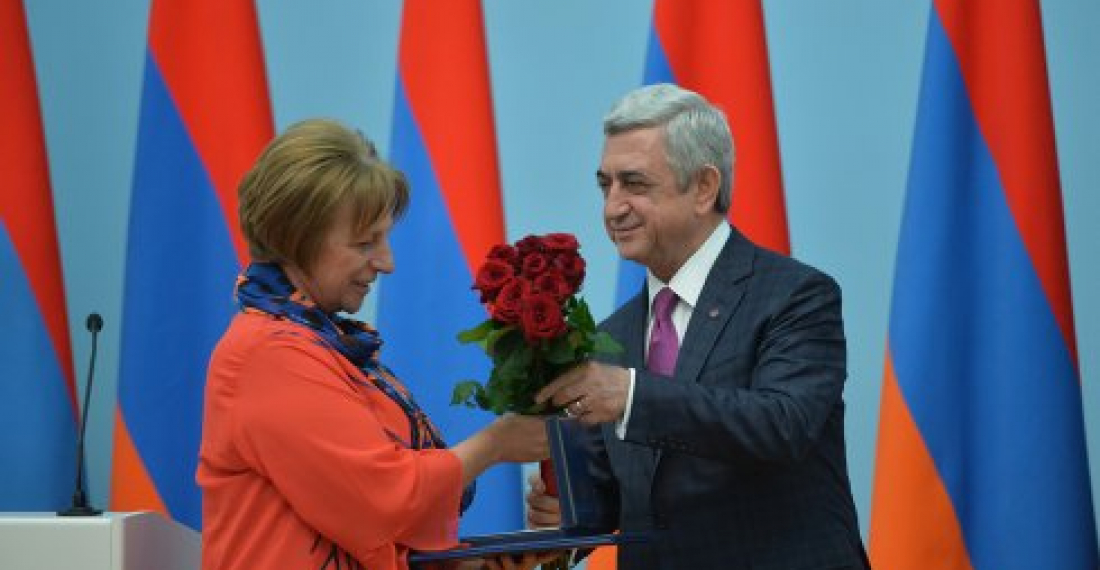The Caucasus Region joins the rest of the world on 8 March to celebrate International Women's Day, but women in the region continue to face discrimination and abuse at all levels of society.
Activities are being held in the Caucasus Region to mark International Women's Day, traditionally celebrated on 8 March. In families, it is an occasion for men to honour women in their household, and on the place of work, female work colleagues are usually presented with gifts and flowers.
International Women's Day is also marked at a state level. President Serzh Sargsyan of Armenia on Wednesday (7 March) hosted an event at the Presidential palace during which women "who were distinguished for their productive work and contribution to various spheres" were honoured.
"The role of women is an indication of how advanced society is. If in a given society women have no serious role, this society can never be called modern", Serzh Sargsyan said, adding that the women have a great role in the Armenian society. President Sargsyan expressed the hope that year in and year out women's participation in elections in Armenia will increase. "But there is a key factor here. Women must themselves want that. In many cases they do not want to engage in the social-political life of the country", the President said, urging women to engage in state-building more actively.
International Women's Day has also been marked in Azerbaijan with an event organised by the State Committee for Women. Children and Family Affairs. State Committee Chairperson, Hicran Huseynova said in a speech that the event started to be marked in Azerbaijan during the days of the Azerbaijan Democractic Republic in 1918. Husseynova spoke about the role of Azerbaijani women in the Karabakh struggle and in the process of state-buiilding.
President Vladimir Putin congratulated Russia's women upon the March 8 holiday emphasising their gift to radiate kindness and hospitality.
"Only you, our dear ladies, are capable of creating a hospitable climate at work and at home, to carry the burden of daily chores to take care of the home and children and to serve as a moral example to follow," Putin said in a message broadcast on Rossiya-24 television channel.
Putin said that International Women's Day was a good occasion to address women with words of tremendous respect and to admire their beauty and tenderness.
International Women's Day was established in 1910 at the Congress of the Socialist International in Copenhagen on the initiative of German woman activist and campaigner for women's equality Clara Zetkin. For the first time it was marked in March 1911 in Austria, Denmark, Germany and Switzerland. During the Soviet era International Women's Day was an important holiday, a tradition that has lingered, even if in a different format to the present day in the post-Soviet space.
Commonspace.eu political editor said in a comment that despite all the festivities and celebrations the plight of women in the Caucasus region, and more broadly in the post Soviet space remains challenging. Except for some notable exceptions, women remain by and large on the margins of the political process and public life. Abuse of women at all levels of society - from the state to the family, remains widespread with societies resisting pressure to discuss these difficult issues openly. Abuse of women is often discussed in the context of protecting "traditional values". One can also detect that organisations working for women's rights face pressure from authorities, as well as other parts of society, in a number of countries. One redeeming feature that is largely a legacy of Soviet times is the fact that in many cases young women have equal access to the education system. One hopes that International Women's Day will not be marked simply as a quaint holiday to celebrate women's "beauty and tenderness", but will also be used to emphasise the need to focus on the problems of women, and foremost their right for equality.".
The editorial team of commonspace.eu extends to all women in the Caucasus, Russia and beyond their best wishes on the occasion of International Women's Day.
source: commonspace.eu
photo: The president of Armenia Serzh Sarggsyan presenting flowers to a female personality on the occasion of International Women's day at an event at the presidential palace in Yerevan on 7 March 2018 (picture courtesy of the press service of the president of Armenia)






